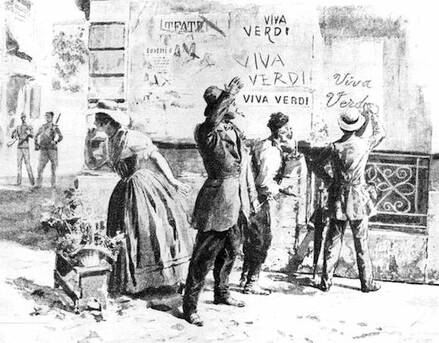 “Viva Verdi” – “Vittorio Emmanuelle Re D’Italia” “Viva Verdi” – “Vittorio Emmanuelle Re D’Italia” For the last few weeks the music world has been quite a chaotic game of musical chairs since Russia started to invade Ukraine. Prominent Russian musicians have had their concerts and contracts cancelled in the west; the Ukrainian National Anthem has been performed before performances of Verdi’s Don Carlos at New York’s Metropolitan Opera; the Berlin Philharmonic dedicated their Mahler Resurrection Symphony performances to the people of Ukraine and projected the Ukrainian flag onto the wall of their concert hall; the body of the assassinated Siegfried in Wagner’s Götterdämmerung was enshrouded in the Ukraine flag during performances at Madrid’s Teatro Real; and Russian musical works have been replaced by other music in concerts and broadcasts in many places, including here in New Zealand. Some say that “politics has no place in music”, but let’s think this through! Political intervention from both church and state were certainly factors in every aspect of music before the eighteenth century, but let’s consider just a few of the many examples from the Baroque period onwards . . . George Frideric Handel chose many of his opera subjects for their potential to exalt historical or legendary kings in support for England’s sometimes unpopular German-speaking monarchy; and that’s not to mention Handel’s many Coronation Anthems and other works designed to celebrate royal occasions and which also have political associations. Wolfgang Amadeus Mozart’s choice of Beaumarchais’ play Le Mariage de Figaro as the subject for an opera represented the growing disillusionment with the ruling classes throughout Europe. In Peter Shaffer’s play Amadeus, Mozart convinces the censors that he has removed everything contentious from the plot and says that he hates politics. But Beaumarchais’ condemnation of aristocratic privilege has always been characterised as foreshadowing the French Revolution. Georges Danton, one of the Revolution’s leading figures, said that Beaumarchais’ play “killed off the nobility”, and Napoleon later referred to Le Mariage de Figaro as “The Revolution already in action”. Other operas by Mozart explore similarly political ideas – think about the concept of ‘Droit du Seigneur’ in Don Giovanni. Rossini used another Beaumarchais play, Le Barbier de Séville (to which Le Mariage de Figaro is the sequel), while Donizetti used similarly revolutionary and other political subjects by Walter Scott and Friedrich Schiller. And surely the obvious parallels with the situation in Italy, to the Swiss hero William Tell’s resistance to Austrian rule, are no coincidence in Rossini’s great final opera (1829). Beethoven originally dedicated his Eroica Symphony to Napoleon, seeing him as the people’s liberator from the yoke of the old feudal world of aristocratic subjugation and, in Beethoven’s own case, from the servitude of court musicians. But the Eroica dedication on the symphony’s title page was unceremoniously scoured out by the composer when Napoleon crowned himself Emperor. Many of Beethoven’s greatest works maintain a strong thematic trend expressing struggle against various forms of oppression and subjugation, leading to triumph at the end. The Eroica is a prime example of that, as are also the Fifth and Ninth Symphonies, the opera Fidelio, the incidental music to Goethe’s play Egmont and much else. Mention of Beethoven’s Fifth Symphony reminds us that, despite it being a work by a German composer, its opening motif was used by Winston Churchill to introduce his WWII radio broadcasts. With the motif’s dit-dit-dit-dah being Morse code for ‘V’ (for Victory), Churchill replicated it visually in his famous ‘V’-shaped finger gesture at the time. At the end of 1944 that same Winston Churchill turned his focus of attack to the Greek partisans who had fought on Britain’s side in the war and who had succeeded in pushing the Nazis out of Greece. Apart from those killed at Britain’s hand in this campaign, a young composer and member of the Greek People’s Liberation Army, Iannis Xenakis, lost half his face in Churchill’s offensive. Some years later, musicologist Harry Halbreich, in reference to Xenakis’ now well-established reputation as a leading musical revolutionary, compared his music to Beethoven’s as being “austere, uncomfortable, and never sentimental” as well as being “highly expressive, courageous and energetic”. Further political content can be attributed to Beethoven’s Fifth Symphony when we consider that the composer once commented that it expresses words written about murdered French revolutionary leader Jean-Paul Marat “We swear, sword in hand, to die for the republic and for human rights”. Conductor Nikolaus Harnoncourt says about the Fifth: "This is not music; it is political agitation. It is saying to us: the world we have is no good. Let us change it! Let's go!" And conductor and musicologist John Eliot Gardiner’s research has found that many of the themes in Beethoven’s symphonies are based on French revolutionary songs. Giuseppe Verdi, even more so than Mozart, Rossini and Donizetti in the world of Italian opera, was an actively political animal. There can be little doubt that the famous prayer for freedom, the Chorus of Hebrew Slaves, in his third opera Nabucco (1842), expressed his own deep desire to see the unification of Italy and the end of Austrian rule – “O mia patria, si bella e perduta” / "O my country, so beautiful, and lost”. The sentiments expressed in several of Verdi’s other operas – e.g. Attila, I Lombardi and Giovanna d’Arco – are even more obviously politically motivated. Chants of “Viva Verdi” both inside and outside Italian opera houses were hardly subtle in their true motive – the letters of Verdi’s name standing for “Vittorio Emmanuelle Re D’Italia”; and the Sardinian ruler, Victor Emmanuelle, did indeed become the first king of an independent and unified Italy in 1861, the same year that Verdi himself was elected to the first Italian parliament. On the opposite side of the Austrian-Italian conflict, even Johann Strauss I needs mention for his most famous composition as his Radetzky March of 1848 was written to celebrate Austrian Field Marshal Joseph Radetzky’s victory in quashing an Italian uprising at the battle of Custoza. Victor Hugo’s 1832 play Le Roi s’Amuse was banned for fifty years after its one and only performance because it was seen as a deliberate insult to Louis-Philippe, the French king of the time. When Verdi used Hugo’s play for his opera Rigoletto in 1851, he was forced by the censors to change the character of the French king into an Italian duke. Then, in 1859, further political censorship resulted in Verdi altering his opera Gustavo III about the real-life assassination in 1792 of the Swedish king, to become Un Ballo in Maschera about the assassination of a fictional governor in colonial Boston! And one of Verdi’s greatest operas, Aida, with its conflicts of personal vs. political loyalties and betrayals, has thought-provoking parallels with the dilemmas that Russian musicians must surely be facing this month. Before we leave the nineteenth century, passing over numerous other politically motivated, or at least politically expressive musical works (let’s keep Richard Wagner for consideration in the twentieth century), there are two other obvious examples by great and well-known composers. Beethoven’s Wellington’s Victory and Tchaikovsky’s 1812 are both unashamed and partisan celebrations of significant battle victories that played a part in the political shaping of Europe. Then, as the nineteenth century progressed, the Nationalist Movement comprising non-Austro-Germanic composers (Chopin, Smetana, Dvořák, Grieg and others) stated their claims to cultural independence, and culminated in the 1890s with Sibelius’s political protests, in works such as Finlandia and Karelia, against Russian autocracy.
0 Comments
Leave a Reply. |
AuthorTony Ryan has reviewed Christchurch concerts, opera and music theatre productions and many other theatre performances since the mid 1990s. ReviewsTony has presented live and written radio reviews of numerous concerts, opera and other musical events for RNZ Concert for many years. An archive of these reviews can be found at Radio New Zealand - Upbeat
His reviews of opera, music & straight theatre and numerous reviews of buskers and comedy festival performances are available at Theatreview. An archive of Tony’s chamber music reviews is held at Christopher’s Classics He has also reviewed for The Press (Christchurch). Links to Tony's Press reviews are listed below: 2024 Songs for Helen – Music by Chris Adams 2022 A Barber and Bernstein Double Bill – Toi Toi Opera The Strangest of Angels – NZOpera Will King (Baritone) and David Codd (Piano) – Christopher's Classics 2019 Ars Acustica – Free Theatre Truly Madly Baroque – Red Priest The Mousetrap – Lunchbox Theatre Iconoclasts – cLoud Last Night of the Proms – CSO 2018 An Evening with Simon O’Neill NZSO Catch Me If You Can – Blackboard Theatre Brothers in Arms – CSO Fear and Courage – CSO Sin City – CSO Don Giovanni – Narropera at Lansdowne Mad Hatter’s Tea Party – Funatorium Weave – NZTrio Tosca – NZ Opera 2017 Sister Act – Showbiz Broadway to West End – Theatre Royal Chicago – Court Theatre Tchaikovsky Symphony No. 5 – CSO Homage – CSO Last Night of the Proms – CSO SOAR – NZTrio Pianomania – NZSO Rogers & Hammerstein – Showbiz Songs for Nobodies – Ali Harper The Beauty of Baroque – CSO Travels in Italy – NZSO Archives
February 2024
Categories |

 RSS Feed
RSS Feed
